Code of Conduct for Commonwealth Bank of Australia
VerifiedAdded on 2023/06/07
|10
|2977
|94
AI Summary
This article discusses the Code of Conduct for Commonwealth Bank of Australia, which aims to ensure smooth and ethical flow of work practice within the organisation. It covers the responsibility of the bank and employees, core principles, and guidelines for employees to follow. The article also explains how to report any breach of the code.
Contribute Materials
Your contribution can guide someone’s learning journey. Share your
documents today.
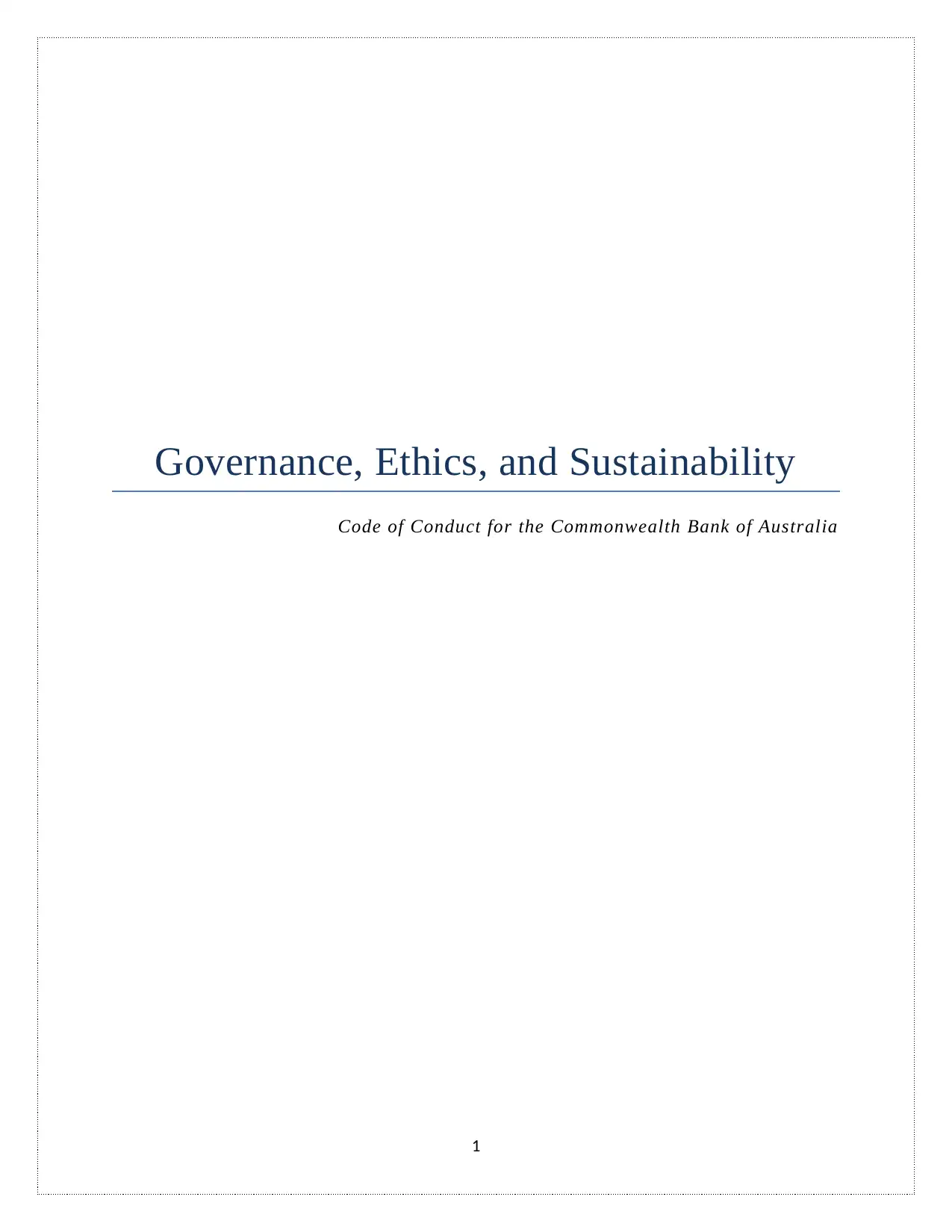
Governance, Ethics, and Sustainability
Code of Conduct for the Commonwealth Bank of Australia
1
Code of Conduct for the Commonwealth Bank of Australia
1
Secure Best Marks with AI Grader
Need help grading? Try our AI Grader for instant feedback on your assignments.
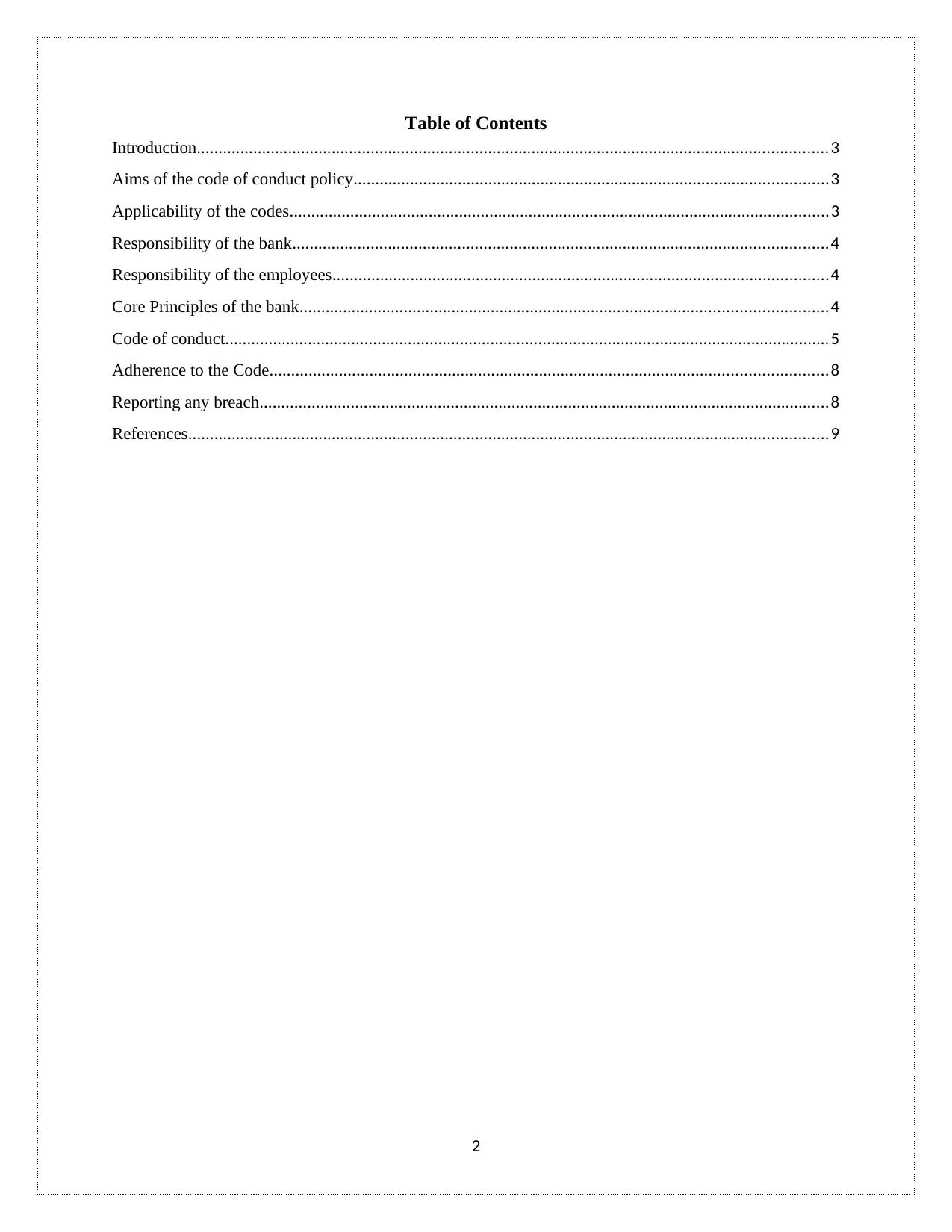
Table of Contents
Introduction.................................................................................................................................................3
Aims of the code of conduct policy.............................................................................................................3
Applicability of the codes............................................................................................................................3
Responsibility of the bank...........................................................................................................................4
Responsibility of the employees..................................................................................................................4
Core Principles of the bank.........................................................................................................................4
Code of conduct...........................................................................................................................................5
Adherence to the Code................................................................................................................................8
Reporting any breach...................................................................................................................................8
References...................................................................................................................................................9
2
Introduction.................................................................................................................................................3
Aims of the code of conduct policy.............................................................................................................3
Applicability of the codes............................................................................................................................3
Responsibility of the bank...........................................................................................................................4
Responsibility of the employees..................................................................................................................4
Core Principles of the bank.........................................................................................................................4
Code of conduct...........................................................................................................................................5
Adherence to the Code................................................................................................................................8
Reporting any breach...................................................................................................................................8
References...................................................................................................................................................9
2
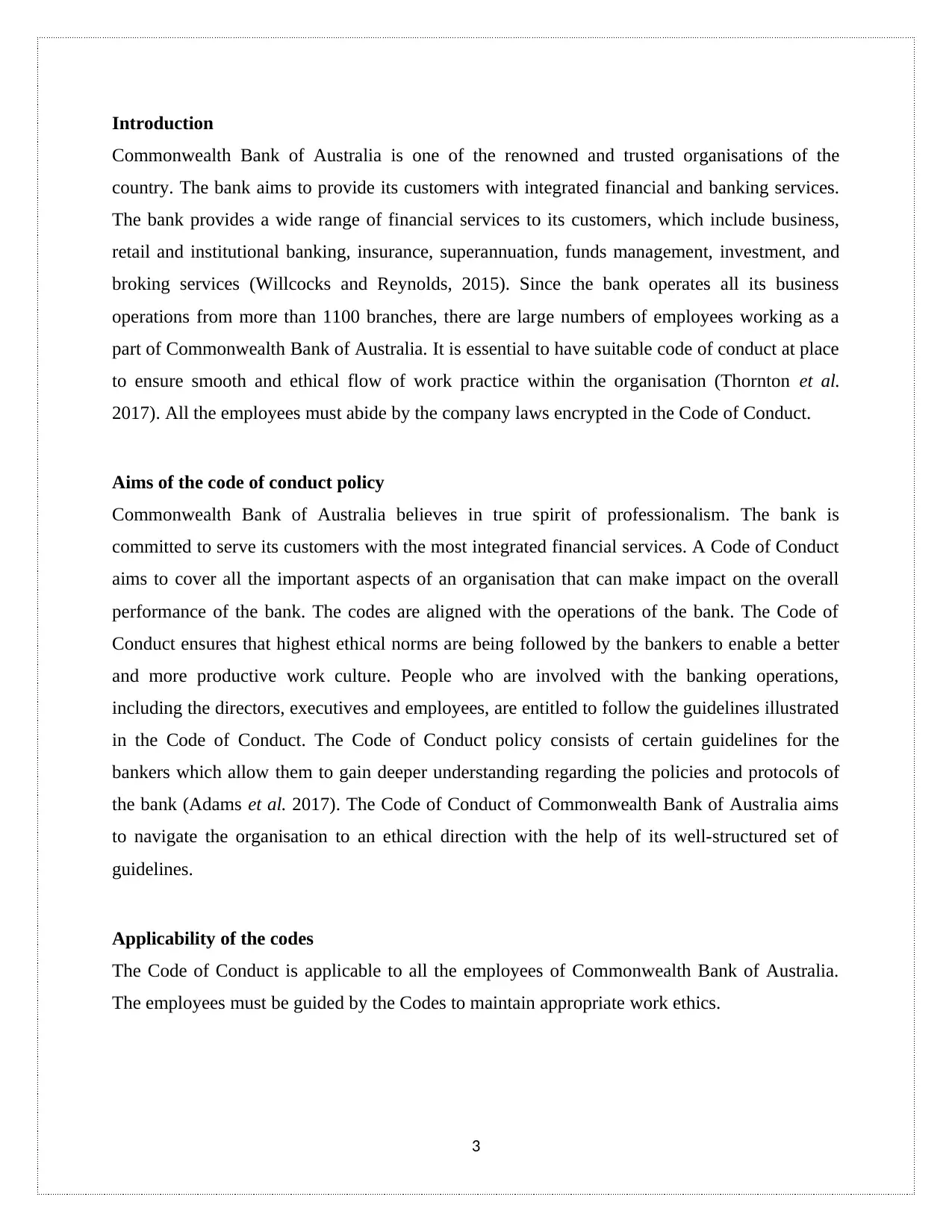
Introduction
Commonwealth Bank of Australia is one of the renowned and trusted organisations of the
country. The bank aims to provide its customers with integrated financial and banking services.
The bank provides a wide range of financial services to its customers, which include business,
retail and institutional banking, insurance, superannuation, funds management, investment, and
broking services (Willcocks and Reynolds, 2015). Since the bank operates all its business
operations from more than 1100 branches, there are large numbers of employees working as a
part of Commonwealth Bank of Australia. It is essential to have suitable code of conduct at place
to ensure smooth and ethical flow of work practice within the organisation (Thornton et al.
2017). All the employees must abide by the company laws encrypted in the Code of Conduct.
Aims of the code of conduct policy
Commonwealth Bank of Australia believes in true spirit of professionalism. The bank is
committed to serve its customers with the most integrated financial services. A Code of Conduct
aims to cover all the important aspects of an organisation that can make impact on the overall
performance of the bank. The codes are aligned with the operations of the bank. The Code of
Conduct ensures that highest ethical norms are being followed by the bankers to enable a better
and more productive work culture. People who are involved with the banking operations,
including the directors, executives and employees, are entitled to follow the guidelines illustrated
in the Code of Conduct. The Code of Conduct policy consists of certain guidelines for the
bankers which allow them to gain deeper understanding regarding the policies and protocols of
the bank (Adams et al. 2017). The Code of Conduct of Commonwealth Bank of Australia aims
to navigate the organisation to an ethical direction with the help of its well-structured set of
guidelines.
Applicability of the codes
The Code of Conduct is applicable to all the employees of Commonwealth Bank of Australia.
The employees must be guided by the Codes to maintain appropriate work ethics.
3
Commonwealth Bank of Australia is one of the renowned and trusted organisations of the
country. The bank aims to provide its customers with integrated financial and banking services.
The bank provides a wide range of financial services to its customers, which include business,
retail and institutional banking, insurance, superannuation, funds management, investment, and
broking services (Willcocks and Reynolds, 2015). Since the bank operates all its business
operations from more than 1100 branches, there are large numbers of employees working as a
part of Commonwealth Bank of Australia. It is essential to have suitable code of conduct at place
to ensure smooth and ethical flow of work practice within the organisation (Thornton et al.
2017). All the employees must abide by the company laws encrypted in the Code of Conduct.
Aims of the code of conduct policy
Commonwealth Bank of Australia believes in true spirit of professionalism. The bank is
committed to serve its customers with the most integrated financial services. A Code of Conduct
aims to cover all the important aspects of an organisation that can make impact on the overall
performance of the bank. The codes are aligned with the operations of the bank. The Code of
Conduct ensures that highest ethical norms are being followed by the bankers to enable a better
and more productive work culture. People who are involved with the banking operations,
including the directors, executives and employees, are entitled to follow the guidelines illustrated
in the Code of Conduct. The Code of Conduct policy consists of certain guidelines for the
bankers which allow them to gain deeper understanding regarding the policies and protocols of
the bank (Adams et al. 2017). The Code of Conduct of Commonwealth Bank of Australia aims
to navigate the organisation to an ethical direction with the help of its well-structured set of
guidelines.
Applicability of the codes
The Code of Conduct is applicable to all the employees of Commonwealth Bank of Australia.
The employees must be guided by the Codes to maintain appropriate work ethics.
3
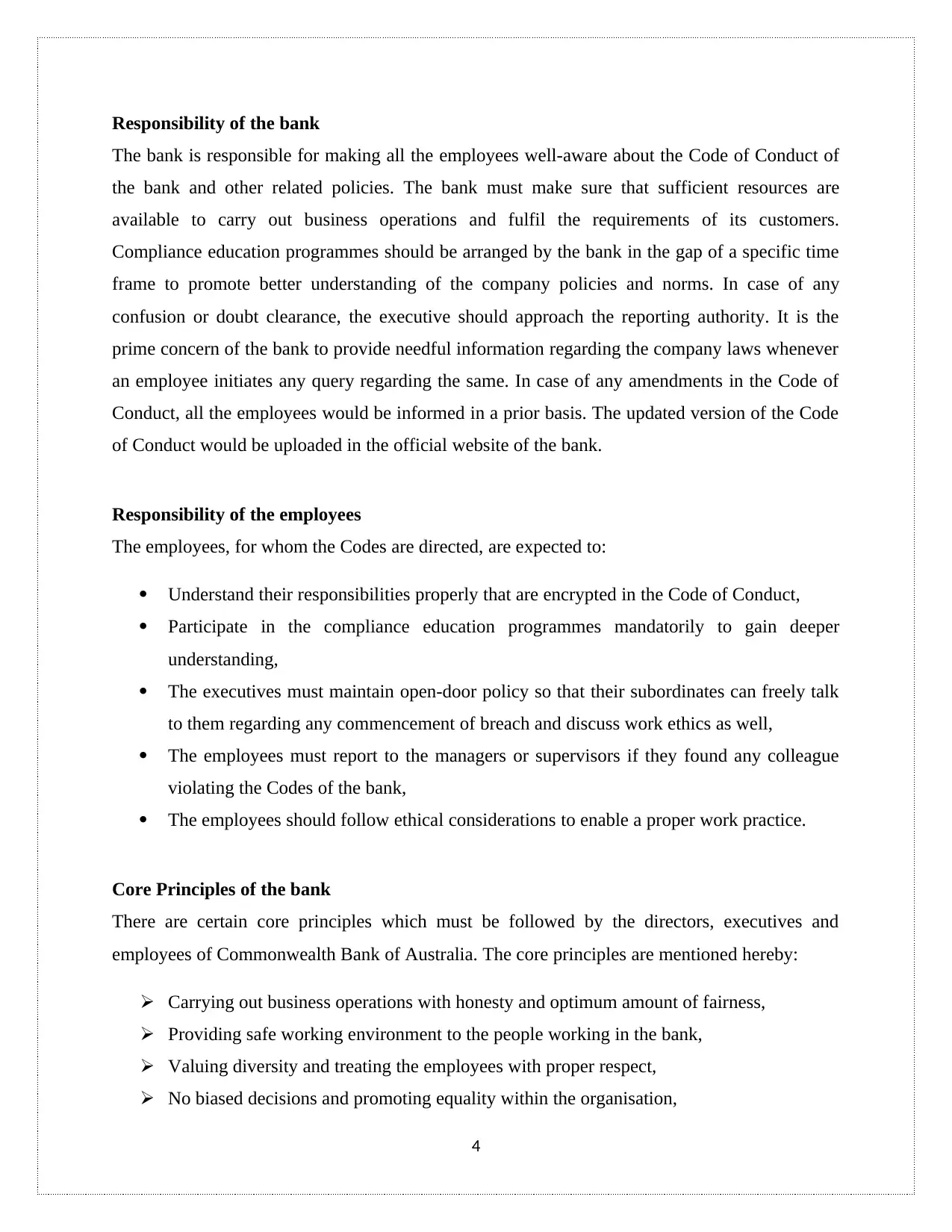
Responsibility of the bank
The bank is responsible for making all the employees well-aware about the Code of Conduct of
the bank and other related policies. The bank must make sure that sufficient resources are
available to carry out business operations and fulfil the requirements of its customers.
Compliance education programmes should be arranged by the bank in the gap of a specific time
frame to promote better understanding of the company policies and norms. In case of any
confusion or doubt clearance, the executive should approach the reporting authority. It is the
prime concern of the bank to provide needful information regarding the company laws whenever
an employee initiates any query regarding the same. In case of any amendments in the Code of
Conduct, all the employees would be informed in a prior basis. The updated version of the Code
of Conduct would be uploaded in the official website of the bank.
Responsibility of the employees
The employees, for whom the Codes are directed, are expected to:
Understand their responsibilities properly that are encrypted in the Code of Conduct,
Participate in the compliance education programmes mandatorily to gain deeper
understanding,
The executives must maintain open-door policy so that their subordinates can freely talk
to them regarding any commencement of breach and discuss work ethics as well,
The employees must report to the managers or supervisors if they found any colleague
violating the Codes of the bank,
The employees should follow ethical considerations to enable a proper work practice.
Core Principles of the bank
There are certain core principles which must be followed by the directors, executives and
employees of Commonwealth Bank of Australia. The core principles are mentioned hereby:
Carrying out business operations with honesty and optimum amount of fairness,
Providing safe working environment to the people working in the bank,
Valuing diversity and treating the employees with proper respect,
No biased decisions and promoting equality within the organisation,
4
The bank is responsible for making all the employees well-aware about the Code of Conduct of
the bank and other related policies. The bank must make sure that sufficient resources are
available to carry out business operations and fulfil the requirements of its customers.
Compliance education programmes should be arranged by the bank in the gap of a specific time
frame to promote better understanding of the company policies and norms. In case of any
confusion or doubt clearance, the executive should approach the reporting authority. It is the
prime concern of the bank to provide needful information regarding the company laws whenever
an employee initiates any query regarding the same. In case of any amendments in the Code of
Conduct, all the employees would be informed in a prior basis. The updated version of the Code
of Conduct would be uploaded in the official website of the bank.
Responsibility of the employees
The employees, for whom the Codes are directed, are expected to:
Understand their responsibilities properly that are encrypted in the Code of Conduct,
Participate in the compliance education programmes mandatorily to gain deeper
understanding,
The executives must maintain open-door policy so that their subordinates can freely talk
to them regarding any commencement of breach and discuss work ethics as well,
The employees must report to the managers or supervisors if they found any colleague
violating the Codes of the bank,
The employees should follow ethical considerations to enable a proper work practice.
Core Principles of the bank
There are certain core principles which must be followed by the directors, executives and
employees of Commonwealth Bank of Australia. The core principles are mentioned hereby:
Carrying out business operations with honesty and optimum amount of fairness,
Providing safe working environment to the people working in the bank,
Valuing diversity and treating the employees with proper respect,
No biased decisions and promoting equality within the organisation,
4
Secure Best Marks with AI Grader
Need help grading? Try our AI Grader for instant feedback on your assignments.
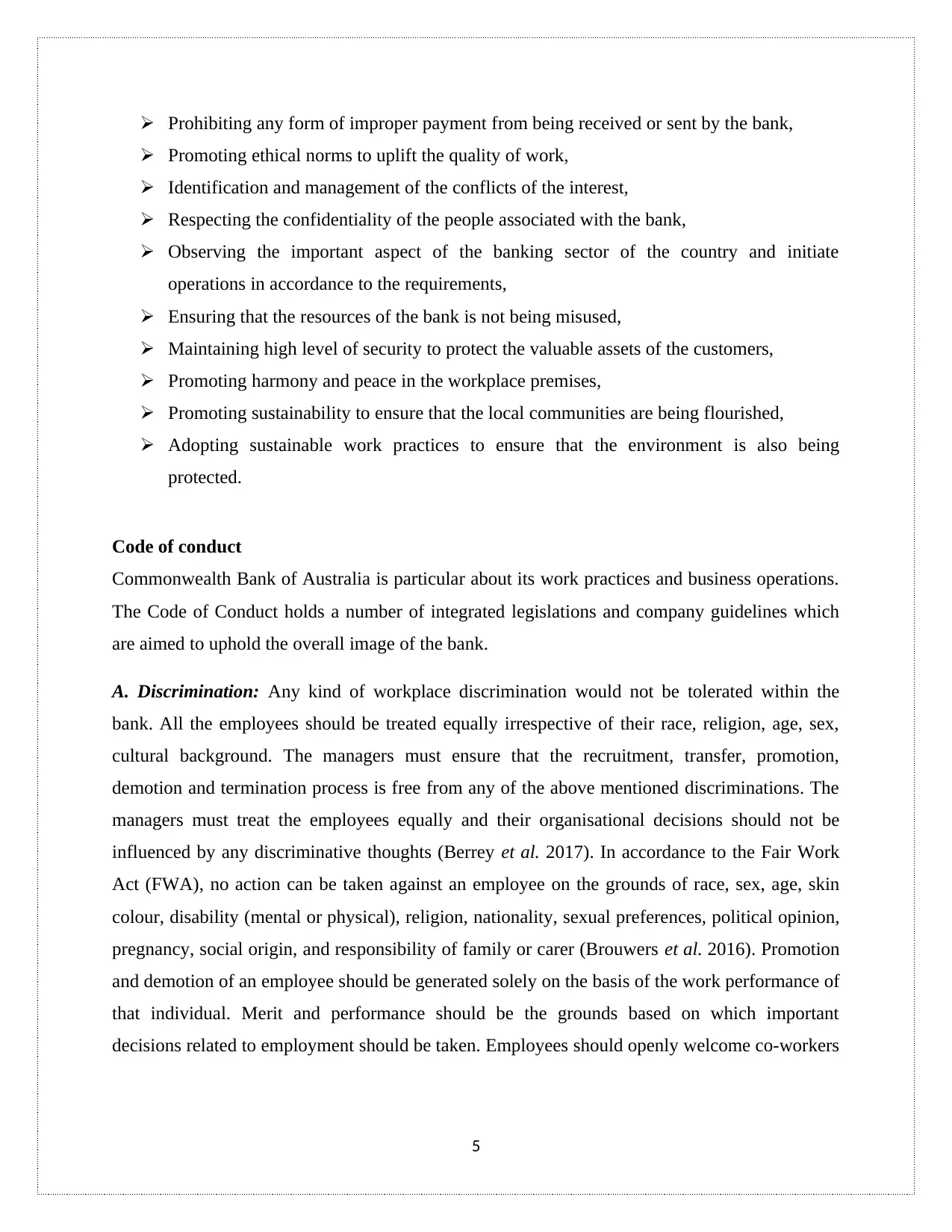
Prohibiting any form of improper payment from being received or sent by the bank,
Promoting ethical norms to uplift the quality of work,
Identification and management of the conflicts of the interest,
Respecting the confidentiality of the people associated with the bank,
Observing the important aspect of the banking sector of the country and initiate
operations in accordance to the requirements,
Ensuring that the resources of the bank is not being misused,
Maintaining high level of security to protect the valuable assets of the customers,
Promoting harmony and peace in the workplace premises,
Promoting sustainability to ensure that the local communities are being flourished,
Adopting sustainable work practices to ensure that the environment is also being
protected.
Code of conduct
Commonwealth Bank of Australia is particular about its work practices and business operations.
The Code of Conduct holds a number of integrated legislations and company guidelines which
are aimed to uphold the overall image of the bank.
A. Discrimination: Any kind of workplace discrimination would not be tolerated within the
bank. All the employees should be treated equally irrespective of their race, religion, age, sex,
cultural background. The managers must ensure that the recruitment, transfer, promotion,
demotion and termination process is free from any of the above mentioned discriminations. The
managers must treat the employees equally and their organisational decisions should not be
influenced by any discriminative thoughts (Berrey et al. 2017). In accordance to the Fair Work
Act (FWA), no action can be taken against an employee on the grounds of race, sex, age, skin
colour, disability (mental or physical), religion, nationality, sexual preferences, political opinion,
pregnancy, social origin, and responsibility of family or carer (Brouwers et al. 2016). Promotion
and demotion of an employee should be generated solely on the basis of the work performance of
that individual. Merit and performance should be the grounds based on which important
decisions related to employment should be taken. Employees should openly welcome co-workers
5
Promoting ethical norms to uplift the quality of work,
Identification and management of the conflicts of the interest,
Respecting the confidentiality of the people associated with the bank,
Observing the important aspect of the banking sector of the country and initiate
operations in accordance to the requirements,
Ensuring that the resources of the bank is not being misused,
Maintaining high level of security to protect the valuable assets of the customers,
Promoting harmony and peace in the workplace premises,
Promoting sustainability to ensure that the local communities are being flourished,
Adopting sustainable work practices to ensure that the environment is also being
protected.
Code of conduct
Commonwealth Bank of Australia is particular about its work practices and business operations.
The Code of Conduct holds a number of integrated legislations and company guidelines which
are aimed to uphold the overall image of the bank.
A. Discrimination: Any kind of workplace discrimination would not be tolerated within the
bank. All the employees should be treated equally irrespective of their race, religion, age, sex,
cultural background. The managers must ensure that the recruitment, transfer, promotion,
demotion and termination process is free from any of the above mentioned discriminations. The
managers must treat the employees equally and their organisational decisions should not be
influenced by any discriminative thoughts (Berrey et al. 2017). In accordance to the Fair Work
Act (FWA), no action can be taken against an employee on the grounds of race, sex, age, skin
colour, disability (mental or physical), religion, nationality, sexual preferences, political opinion,
pregnancy, social origin, and responsibility of family or carer (Brouwers et al. 2016). Promotion
and demotion of an employee should be generated solely on the basis of the work performance of
that individual. Merit and performance should be the grounds based on which important
decisions related to employment should be taken. Employees should openly welcome co-workers
5
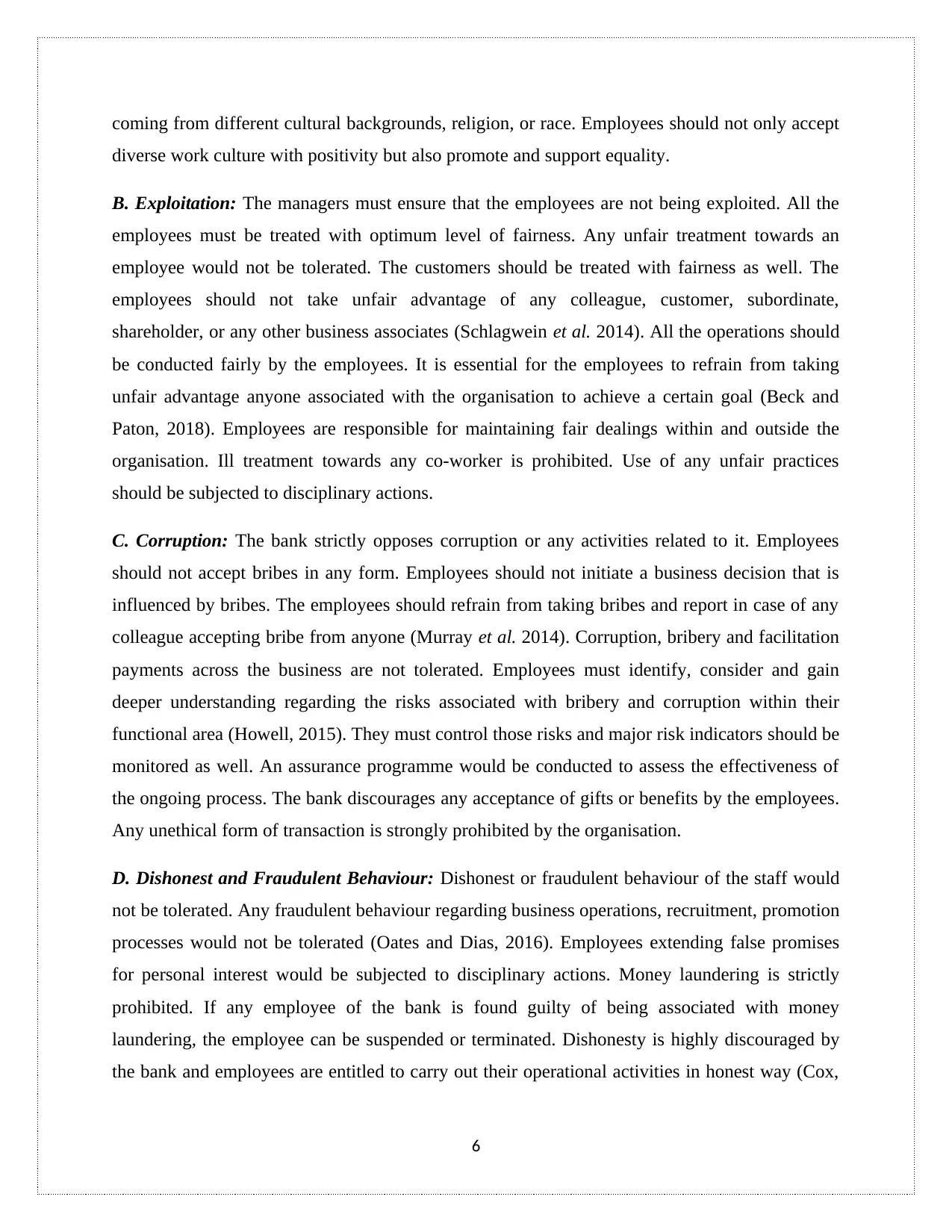
coming from different cultural backgrounds, religion, or race. Employees should not only accept
diverse work culture with positivity but also promote and support equality.
B. Exploitation: The managers must ensure that the employees are not being exploited. All the
employees must be treated with optimum level of fairness. Any unfair treatment towards an
employee would not be tolerated. The customers should be treated with fairness as well. The
employees should not take unfair advantage of any colleague, customer, subordinate,
shareholder, or any other business associates (Schlagwein et al. 2014). All the operations should
be conducted fairly by the employees. It is essential for the employees to refrain from taking
unfair advantage anyone associated with the organisation to achieve a certain goal (Beck and
Paton, 2018). Employees are responsible for maintaining fair dealings within and outside the
organisation. Ill treatment towards any co-worker is prohibited. Use of any unfair practices
should be subjected to disciplinary actions.
C. Corruption: The bank strictly opposes corruption or any activities related to it. Employees
should not accept bribes in any form. Employees should not initiate a business decision that is
influenced by bribes. The employees should refrain from taking bribes and report in case of any
colleague accepting bribe from anyone (Murray et al. 2014). Corruption, bribery and facilitation
payments across the business are not tolerated. Employees must identify, consider and gain
deeper understanding regarding the risks associated with bribery and corruption within their
functional area (Howell, 2015). They must control those risks and major risk indicators should be
monitored as well. An assurance programme would be conducted to assess the effectiveness of
the ongoing process. The bank discourages any acceptance of gifts or benefits by the employees.
Any unethical form of transaction is strongly prohibited by the organisation.
D. Dishonest and Fraudulent Behaviour: Dishonest or fraudulent behaviour of the staff would
not be tolerated. Any fraudulent behaviour regarding business operations, recruitment, promotion
processes would not be tolerated (Oates and Dias, 2016). Employees extending false promises
for personal interest would be subjected to disciplinary actions. Money laundering is strictly
prohibited. If any employee of the bank is found guilty of being associated with money
laundering, the employee can be suspended or terminated. Dishonesty is highly discouraged by
the bank and employees are entitled to carry out their operational activities in honest way (Cox,
6
diverse work culture with positivity but also promote and support equality.
B. Exploitation: The managers must ensure that the employees are not being exploited. All the
employees must be treated with optimum level of fairness. Any unfair treatment towards an
employee would not be tolerated. The customers should be treated with fairness as well. The
employees should not take unfair advantage of any colleague, customer, subordinate,
shareholder, or any other business associates (Schlagwein et al. 2014). All the operations should
be conducted fairly by the employees. It is essential for the employees to refrain from taking
unfair advantage anyone associated with the organisation to achieve a certain goal (Beck and
Paton, 2018). Employees are responsible for maintaining fair dealings within and outside the
organisation. Ill treatment towards any co-worker is prohibited. Use of any unfair practices
should be subjected to disciplinary actions.
C. Corruption: The bank strictly opposes corruption or any activities related to it. Employees
should not accept bribes in any form. Employees should not initiate a business decision that is
influenced by bribes. The employees should refrain from taking bribes and report in case of any
colleague accepting bribe from anyone (Murray et al. 2014). Corruption, bribery and facilitation
payments across the business are not tolerated. Employees must identify, consider and gain
deeper understanding regarding the risks associated with bribery and corruption within their
functional area (Howell, 2015). They must control those risks and major risk indicators should be
monitored as well. An assurance programme would be conducted to assess the effectiveness of
the ongoing process. The bank discourages any acceptance of gifts or benefits by the employees.
Any unethical form of transaction is strongly prohibited by the organisation.
D. Dishonest and Fraudulent Behaviour: Dishonest or fraudulent behaviour of the staff would
not be tolerated. Any fraudulent behaviour regarding business operations, recruitment, promotion
processes would not be tolerated (Oates and Dias, 2016). Employees extending false promises
for personal interest would be subjected to disciplinary actions. Money laundering is strictly
prohibited. If any employee of the bank is found guilty of being associated with money
laundering, the employee can be suspended or terminated. Dishonesty is highly discouraged by
the bank and employees are entitled to carry out their operational activities in honest way (Cox,
6
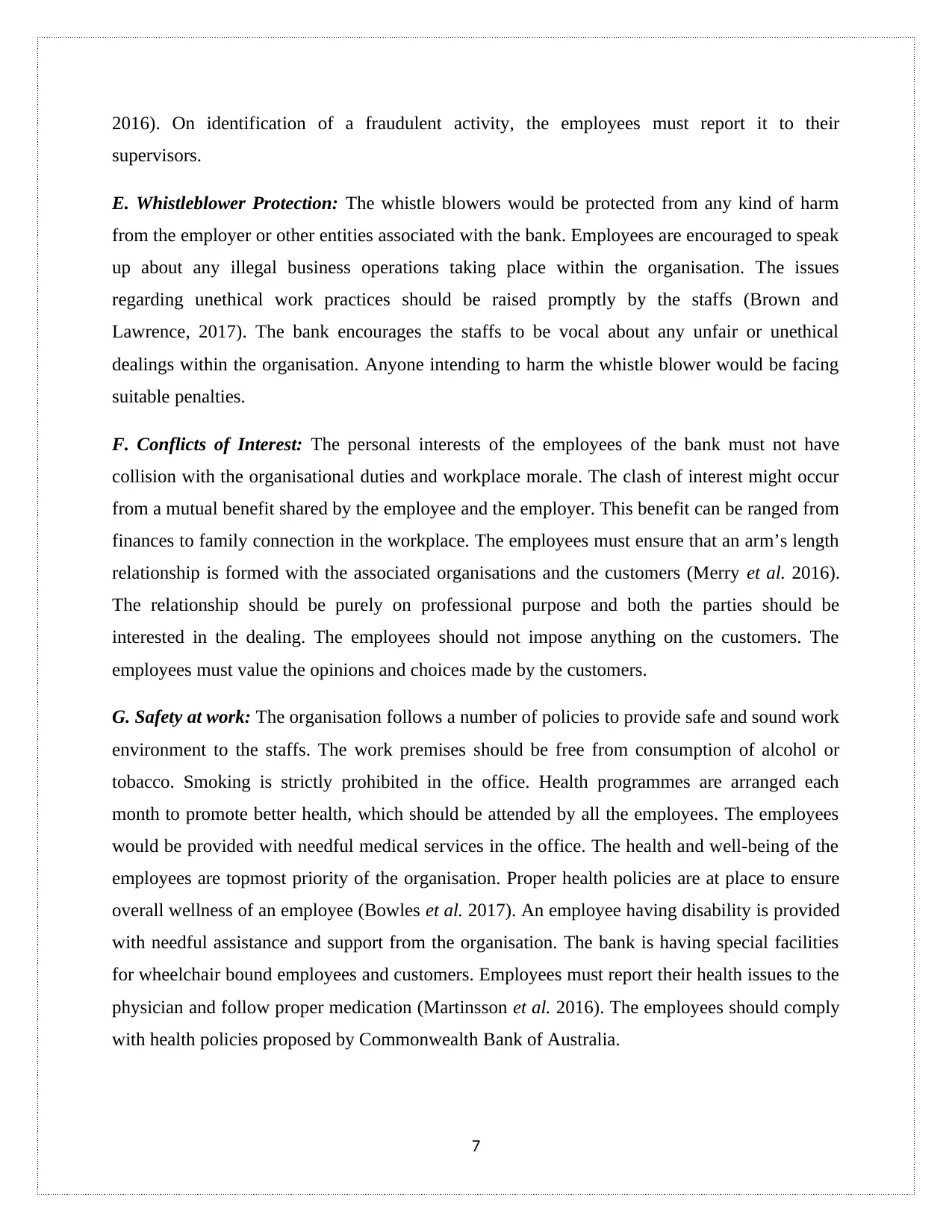
2016). On identification of a fraudulent activity, the employees must report it to their
supervisors.
E. Whistleblower Protection: The whistle blowers would be protected from any kind of harm
from the employer or other entities associated with the bank. Employees are encouraged to speak
up about any illegal business operations taking place within the organisation. The issues
regarding unethical work practices should be raised promptly by the staffs (Brown and
Lawrence, 2017). The bank encourages the staffs to be vocal about any unfair or unethical
dealings within the organisation. Anyone intending to harm the whistle blower would be facing
suitable penalties.
F. Conflicts of Interest: The personal interests of the employees of the bank must not have
collision with the organisational duties and workplace morale. The clash of interest might occur
from a mutual benefit shared by the employee and the employer. This benefit can be ranged from
finances to family connection in the workplace. The employees must ensure that an arm’s length
relationship is formed with the associated organisations and the customers (Merry et al. 2016).
The relationship should be purely on professional purpose and both the parties should be
interested in the dealing. The employees should not impose anything on the customers. The
employees must value the opinions and choices made by the customers.
G. Safety at work: The organisation follows a number of policies to provide safe and sound work
environment to the staffs. The work premises should be free from consumption of alcohol or
tobacco. Smoking is strictly prohibited in the office. Health programmes are arranged each
month to promote better health, which should be attended by all the employees. The employees
would be provided with needful medical services in the office. The health and well-being of the
employees are topmost priority of the organisation. Proper health policies are at place to ensure
overall wellness of an employee (Bowles et al. 2017). An employee having disability is provided
with needful assistance and support from the organisation. The bank is having special facilities
for wheelchair bound employees and customers. Employees must report their health issues to the
physician and follow proper medication (Martinsson et al. 2016). The employees should comply
with health policies proposed by Commonwealth Bank of Australia.
7
supervisors.
E. Whistleblower Protection: The whistle blowers would be protected from any kind of harm
from the employer or other entities associated with the bank. Employees are encouraged to speak
up about any illegal business operations taking place within the organisation. The issues
regarding unethical work practices should be raised promptly by the staffs (Brown and
Lawrence, 2017). The bank encourages the staffs to be vocal about any unfair or unethical
dealings within the organisation. Anyone intending to harm the whistle blower would be facing
suitable penalties.
F. Conflicts of Interest: The personal interests of the employees of the bank must not have
collision with the organisational duties and workplace morale. The clash of interest might occur
from a mutual benefit shared by the employee and the employer. This benefit can be ranged from
finances to family connection in the workplace. The employees must ensure that an arm’s length
relationship is formed with the associated organisations and the customers (Merry et al. 2016).
The relationship should be purely on professional purpose and both the parties should be
interested in the dealing. The employees should not impose anything on the customers. The
employees must value the opinions and choices made by the customers.
G. Safety at work: The organisation follows a number of policies to provide safe and sound work
environment to the staffs. The work premises should be free from consumption of alcohol or
tobacco. Smoking is strictly prohibited in the office. Health programmes are arranged each
month to promote better health, which should be attended by all the employees. The employees
would be provided with needful medical services in the office. The health and well-being of the
employees are topmost priority of the organisation. Proper health policies are at place to ensure
overall wellness of an employee (Bowles et al. 2017). An employee having disability is provided
with needful assistance and support from the organisation. The bank is having special facilities
for wheelchair bound employees and customers. Employees must report their health issues to the
physician and follow proper medication (Martinsson et al. 2016). The employees should comply
with health policies proposed by Commonwealth Bank of Australia.
7
Paraphrase This Document
Need a fresh take? Get an instant paraphrase of this document with our AI Paraphraser
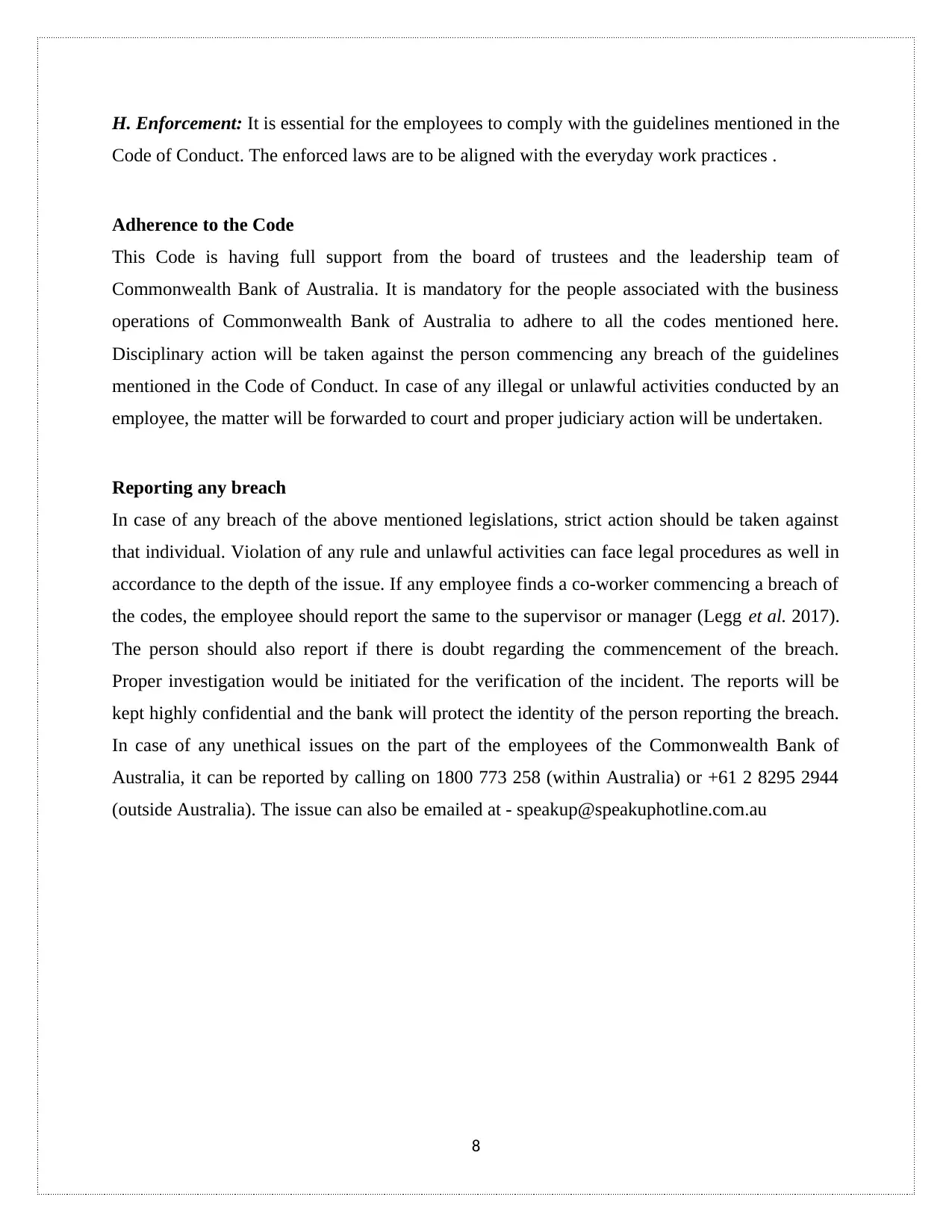
H. Enforcement: It is essential for the employees to comply with the guidelines mentioned in the
Code of Conduct. The enforced laws are to be aligned with the everyday work practices .
Adherence to the Code
This Code is having full support from the board of trustees and the leadership team of
Commonwealth Bank of Australia. It is mandatory for the people associated with the business
operations of Commonwealth Bank of Australia to adhere to all the codes mentioned here.
Disciplinary action will be taken against the person commencing any breach of the guidelines
mentioned in the Code of Conduct. In case of any illegal or unlawful activities conducted by an
employee, the matter will be forwarded to court and proper judiciary action will be undertaken.
Reporting any breach
In case of any breach of the above mentioned legislations, strict action should be taken against
that individual. Violation of any rule and unlawful activities can face legal procedures as well in
accordance to the depth of the issue. If any employee finds a co-worker commencing a breach of
the codes, the employee should report the same to the supervisor or manager (Legg et al. 2017).
The person should also report if there is doubt regarding the commencement of the breach.
Proper investigation would be initiated for the verification of the incident. The reports will be
kept highly confidential and the bank will protect the identity of the person reporting the breach.
In case of any unethical issues on the part of the employees of the Commonwealth Bank of
Australia, it can be reported by calling on 1800 773 258 (within Australia) or +61 2 8295 2944
(outside Australia). The issue can also be emailed at - speakup@speakuphotline.com.au
8
Code of Conduct. The enforced laws are to be aligned with the everyday work practices .
Adherence to the Code
This Code is having full support from the board of trustees and the leadership team of
Commonwealth Bank of Australia. It is mandatory for the people associated with the business
operations of Commonwealth Bank of Australia to adhere to all the codes mentioned here.
Disciplinary action will be taken against the person commencing any breach of the guidelines
mentioned in the Code of Conduct. In case of any illegal or unlawful activities conducted by an
employee, the matter will be forwarded to court and proper judiciary action will be undertaken.
Reporting any breach
In case of any breach of the above mentioned legislations, strict action should be taken against
that individual. Violation of any rule and unlawful activities can face legal procedures as well in
accordance to the depth of the issue. If any employee finds a co-worker commencing a breach of
the codes, the employee should report the same to the supervisor or manager (Legg et al. 2017).
The person should also report if there is doubt regarding the commencement of the breach.
Proper investigation would be initiated for the verification of the incident. The reports will be
kept highly confidential and the bank will protect the identity of the person reporting the breach.
In case of any unethical issues on the part of the employees of the Commonwealth Bank of
Australia, it can be reported by calling on 1800 773 258 (within Australia) or +61 2 8295 2944
(outside Australia). The issue can also be emailed at - speakup@speakuphotline.com.au
8
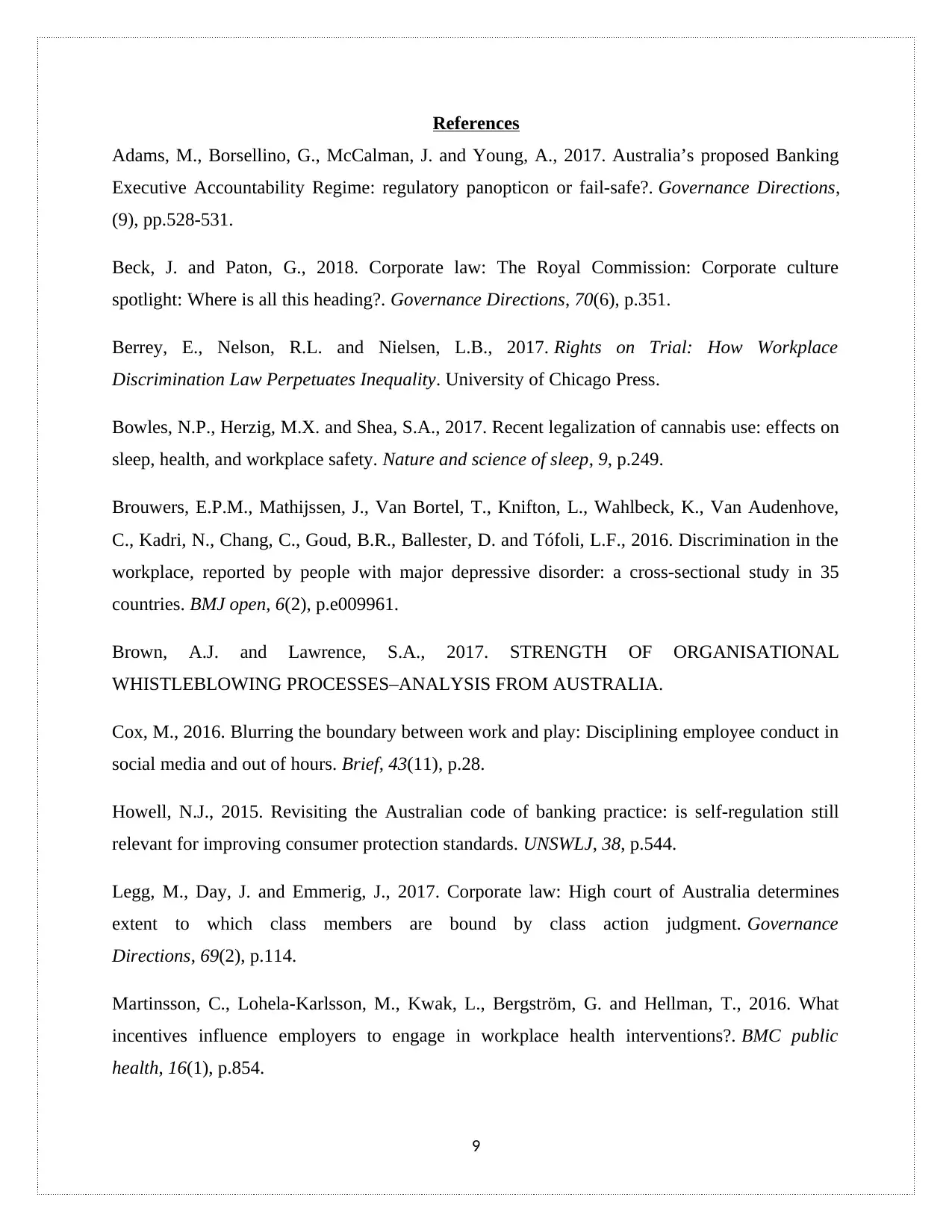
References
Adams, M., Borsellino, G., McCalman, J. and Young, A., 2017. Australia’s proposed Banking
Executive Accountability Regime: regulatory panopticon or fail-safe?. Governance Directions,
(9), pp.528-531.
Beck, J. and Paton, G., 2018. Corporate law: The Royal Commission: Corporate culture
spotlight: Where is all this heading?. Governance Directions, 70(6), p.351.
Berrey, E., Nelson, R.L. and Nielsen, L.B., 2017. Rights on Trial: How Workplace
Discrimination Law Perpetuates Inequality. University of Chicago Press.
Bowles, N.P., Herzig, M.X. and Shea, S.A., 2017. Recent legalization of cannabis use: effects on
sleep, health, and workplace safety. Nature and science of sleep, 9, p.249.
Brouwers, E.P.M., Mathijssen, J., Van Bortel, T., Knifton, L., Wahlbeck, K., Van Audenhove,
C., Kadri, N., Chang, C., Goud, B.R., Ballester, D. and Tófoli, L.F., 2016. Discrimination in the
workplace, reported by people with major depressive disorder: a cross-sectional study in 35
countries. BMJ open, 6(2), p.e009961.
Brown, A.J. and Lawrence, S.A., 2017. STRENGTH OF ORGANISATIONAL
WHISTLEBLOWING PROCESSES–ANALYSIS FROM AUSTRALIA.
Cox, M., 2016. Blurring the boundary between work and play: Disciplining employee conduct in
social media and out of hours. Brief, 43(11), p.28.
Howell, N.J., 2015. Revisiting the Australian code of banking practice: is self-regulation still
relevant for improving consumer protection standards. UNSWLJ, 38, p.544.
Legg, M., Day, J. and Emmerig, J., 2017. Corporate law: High court of Australia determines
extent to which class members are bound by class action judgment. Governance
Directions, 69(2), p.114.
Martinsson, C., Lohela-Karlsson, M., Kwak, L., Bergström, G. and Hellman, T., 2016. What
incentives influence employers to engage in workplace health interventions?. BMC public
health, 16(1), p.854.
9
Adams, M., Borsellino, G., McCalman, J. and Young, A., 2017. Australia’s proposed Banking
Executive Accountability Regime: regulatory panopticon or fail-safe?. Governance Directions,
(9), pp.528-531.
Beck, J. and Paton, G., 2018. Corporate law: The Royal Commission: Corporate culture
spotlight: Where is all this heading?. Governance Directions, 70(6), p.351.
Berrey, E., Nelson, R.L. and Nielsen, L.B., 2017. Rights on Trial: How Workplace
Discrimination Law Perpetuates Inequality. University of Chicago Press.
Bowles, N.P., Herzig, M.X. and Shea, S.A., 2017. Recent legalization of cannabis use: effects on
sleep, health, and workplace safety. Nature and science of sleep, 9, p.249.
Brouwers, E.P.M., Mathijssen, J., Van Bortel, T., Knifton, L., Wahlbeck, K., Van Audenhove,
C., Kadri, N., Chang, C., Goud, B.R., Ballester, D. and Tófoli, L.F., 2016. Discrimination in the
workplace, reported by people with major depressive disorder: a cross-sectional study in 35
countries. BMJ open, 6(2), p.e009961.
Brown, A.J. and Lawrence, S.A., 2017. STRENGTH OF ORGANISATIONAL
WHISTLEBLOWING PROCESSES–ANALYSIS FROM AUSTRALIA.
Cox, M., 2016. Blurring the boundary between work and play: Disciplining employee conduct in
social media and out of hours. Brief, 43(11), p.28.
Howell, N.J., 2015. Revisiting the Australian code of banking practice: is self-regulation still
relevant for improving consumer protection standards. UNSWLJ, 38, p.544.
Legg, M., Day, J. and Emmerig, J., 2017. Corporate law: High court of Australia determines
extent to which class members are bound by class action judgment. Governance
Directions, 69(2), p.114.
Martinsson, C., Lohela-Karlsson, M., Kwak, L., Bergström, G. and Hellman, T., 2016. What
incentives influence employers to engage in workplace health interventions?. BMC public
health, 16(1), p.854.
9
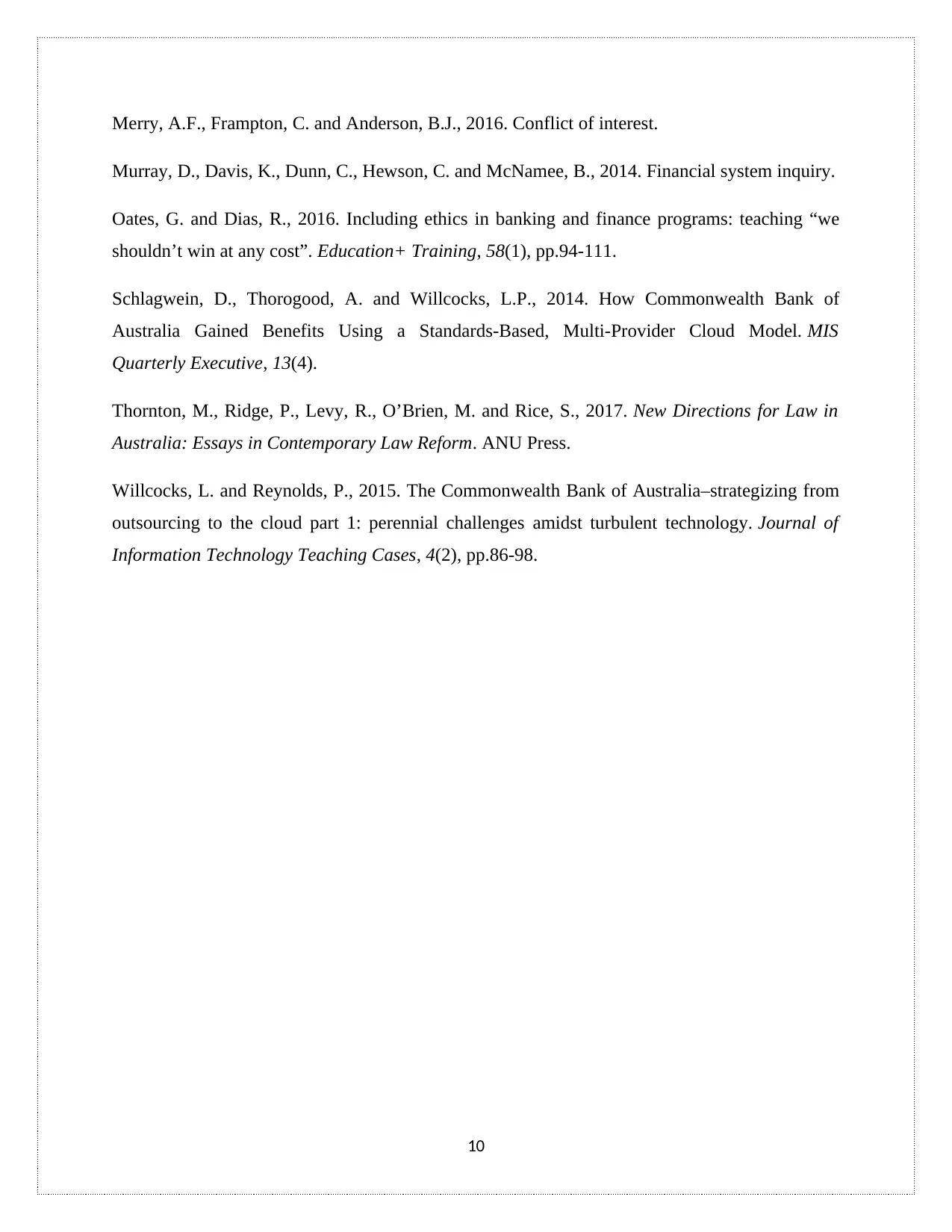
Merry, A.F., Frampton, C. and Anderson, B.J., 2016. Conflict of interest.
Murray, D., Davis, K., Dunn, C., Hewson, C. and McNamee, B., 2014. Financial system inquiry.
Oates, G. and Dias, R., 2016. Including ethics in banking and finance programs: teaching “we
shouldn’t win at any cost”. Education+ Training, 58(1), pp.94-111.
Schlagwein, D., Thorogood, A. and Willcocks, L.P., 2014. How Commonwealth Bank of
Australia Gained Benefits Using a Standards-Based, Multi-Provider Cloud Model. MIS
Quarterly Executive, 13(4).
Thornton, M., Ridge, P., Levy, R., O’Brien, M. and Rice, S., 2017. New Directions for Law in
Australia: Essays in Contemporary Law Reform. ANU Press.
Willcocks, L. and Reynolds, P., 2015. The Commonwealth Bank of Australia–strategizing from
outsourcing to the cloud part 1: perennial challenges amidst turbulent technology. Journal of
Information Technology Teaching Cases, 4(2), pp.86-98.
10
Murray, D., Davis, K., Dunn, C., Hewson, C. and McNamee, B., 2014. Financial system inquiry.
Oates, G. and Dias, R., 2016. Including ethics in banking and finance programs: teaching “we
shouldn’t win at any cost”. Education+ Training, 58(1), pp.94-111.
Schlagwein, D., Thorogood, A. and Willcocks, L.P., 2014. How Commonwealth Bank of
Australia Gained Benefits Using a Standards-Based, Multi-Provider Cloud Model. MIS
Quarterly Executive, 13(4).
Thornton, M., Ridge, P., Levy, R., O’Brien, M. and Rice, S., 2017. New Directions for Law in
Australia: Essays in Contemporary Law Reform. ANU Press.
Willcocks, L. and Reynolds, P., 2015. The Commonwealth Bank of Australia–strategizing from
outsourcing to the cloud part 1: perennial challenges amidst turbulent technology. Journal of
Information Technology Teaching Cases, 4(2), pp.86-98.
10
1 out of 10
Related Documents
Your All-in-One AI-Powered Toolkit for Academic Success.
+13062052269
info@desklib.com
Available 24*7 on WhatsApp / Email
![[object Object]](/_next/static/media/star-bottom.7253800d.svg)
Unlock your academic potential
© 2024 | Zucol Services PVT LTD | All rights reserved.



